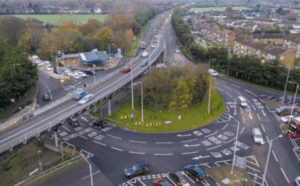Trial changes to make cycling easier and safer are currently in place on the A23 between Oval and Streatham, the CS7 route in Southwark and on Tooley Street and Duke Street Hill in central London.
TfL is now asking for feedback from local residents and businesses in the area on a series of improvements made earlier this year to three south London cycle routes in Lambeth and Southwark.
The trial changes along the A23 between Oval and Streatham, Tooley Street and Duke Street Hill in central London and on the CS7 cycle route between Oval and Elephant & Castle are enabling thousands of cycle journeys every week and giving people confidence to use a bike to get around.
Changes to roads to support increased levels of walking and cycling are a vital part of TfL’s response to the coronavirus pandemic and have contributed to significant increases in cycling across London – including a seven per cent increase in inner London and a 22% increase in outer London in autumn 2020 compared to the previous count in spring 2019.
The start of the engagement process coincides with the start of the UN’s Global Road Safety Week, which is promoting the need for streets across the world which are healthy, green and liveable.
On the A23, TfL made changes to bus lanes to make them safer for people cycling. Changes include wider bus lanes and separate traffic signals for cyclists at junctions in Brixton.
TfL is also asking for feedback on its upgrades to the key CS7 cycle route between Oval and Elephant & Castle. CS7 is one of the most used routes in London and has been improved during the last year to support thousands of journeys in southwest London and beyond.
The changes include new cycle wands to segregate the existing cycle lanes on the westbound and southbound approaches to the Camberwell New Road/ Kennington Park Road junction and wider bus lanes to make it easier for people to cycle in them.
Londoners are also being asked to feedback on the trial changes at Tooley Street and Duke Street Hill, which include sections of light cycle segregation with wands in both directions and the closure of a slip road near the London Bridge Hospital to create a new pedestrian space.
TfL will use the consultations to help decide whether it is necessary to make any changes to the trial schemes and whether they should stay in place permanently.
TfL, working with boroughs across London, has learned a huge amount through its rapid delivery of temporary walking and cycling schemes as an urgent response to the pandemic.
TfL will build on these lessons and those learned from its delivery of schemes before the pandemic to continue quickly delivering the schemes that London will need for a green and sustainable recovery while engaging with a diverse range of stakeholders and communities.
Research shows that walking and cycling benefits people’s physical and mental health, while helping to tackle toxic air and providing an important boost to high streets and the local economy, according to TfL research.
Making our streets safer for people walking and cycling will save lives, and continued investment in active travel is also central to achieving the Mayor’s Vision Zero goal of eradicating all deaths and serious injuries from London’s roads by 2041, said TfL.
London’s Walking and Cycling Commissioner, Dr Will Norman, said: ’The ambition set out in the Mayor’s manifesto on which he was recently re-elected is clear: we must continue to build a comprehensive and safe cycling network, and we must do it fast.
‘We know that these three trial schemes have enabled more people living in and around Lambeth and Southwark to cycle in these areas, no matter what their age or ability. I encourage everyone to have their say in the consultation to help us decide on the future of these upgrades.’
Helen Cansick, TfL’s Head of Healthy Streets Delivery, said: ’We want to make cycling easier and less intimidating on some of London’s busier roads.
‘These trial changes to roads in Lambeth and Southwark aim to give people new to cycling confidence that it is a safe and viable way to make essential journeys now, during the pandemic, but also as part of their longer-term travel habits.
‘We’d really like to hear people’s thoughts on the improvements we’ve made and will continue to work with both councils and people in the area through the trial period.’
Simon Munk, London Cycling Campaign’s Senior Infrastructure Campaigner, said: ‘It is vital the Mayor and TfL move fast and are bold on cycling, walking and motor traffic reduction if London is to face the climate crisis.
‘It’s also vital schemes are trialled so they can be improved using the experience of people who have seen schemes in action, to give informed feedback. We urge everyone to let TfL know how these trial improvements for buses and cycling could be further improved in the future.’
Pic:Yah
























